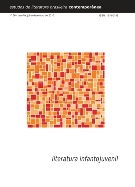A literatura juvenil brasileira no início do século XXI:
autores, obras e tendências
Abstract
O artigo apresenta um estudo sobre a literatura juvenil brasileira publicada na primeira década do século XXI, por meio da análise de obras premiadas pela Fundação Nacional do Livro Infantil e Juvenil e pela Câmara Brasileira do Livro, que outorga o prêmio Jabuti. A partir de dados sistematizados por Marisa Lajolo e Regina Zilberman, apresenta-se um breve panorama da literatura infantojuvenil brasileira entre o período de 1890 a 1980, contextualização que permite o delineamento do percurso e das tendências do gênero ao longo do tempo. Após, com base nos estudos desenvolvidos por Teresa Colomer, expõem-se os principais traços da literatura juvenil atual, os quais são cotejados com as características das narrativas juvenis brasileiras premiadas entre os anos de 2001 e 2009. Por meio da leitura, da observação, da análise e da comparação das obras que integram o corpus, procura-se demonstrar as características da literatura juvenil brasileira produzida na primeira década do século XXI, de maneira a responder quais as principais tendências do gênero e qual sua posição no cenário nacional. Verifi case o surgimento de um bom número de autores novos, a diversidade de temáticas trabalhadas e o aumento da complexidade narrativa.
Downloads
References
ARROYO, Leonardo (1968). Literatura infantil brasileira: ensaio de preliminares para sua história e suas fontes. São Paulo: Melhoramentos.
CÂMARA BRASILEIRA DO LIVRO. Edições do prêmio Jabuti. Disponível em <http://www.cbl.org.br/jabuti/telas/edicoes-anteriores/>. Acesso em: 12 jan. 2010.
COELHO, Nelly Novaes (1981). A literatura infantil. São Paulo: Ática.
_______ (1984). Panorama histórico da literatura infantil/juvenil. São Paulo: Ática.
COLOMER, Teresa (2003). A formação do leitor literário: narrativa infantil e juvenil atual. Trad. Laura Sandroni. São Paulo: Global.
FUNDAÇÃO NACIONAL DO LIVRO INFANTIL E JUVENIL. Livros premiados. Disponível em <http://www.fnlij.org.br/principal.asp>. Acesso em: 11 jan. 2010.
LAJOLO, Marisa e ZILBERMAN, Regina (1985). Literatura infantil brasileira: história & histórias. 2. ed. São Paulo: Ática.
________ (1986). Um Brasil para crianças. São Paulo: Global.
LEAHY-DIOS, Cyana (2005). “A educação literária de jovens leitores: motivos e desmotivos”. In: RETTENMAIER, Miguel (Org.); RÖSING, Tania M. K. (Org.). Questões de literatura para jovens. Passo Fundo: Ed. Universidade de
Passo Fundo.
SALEM, Nazira (1959). História da literatura infantil. Portugal: Mestre Jou.
SOUZA, Gloria Pimentel Correia Botelho de (2006). A literatura infantojuvenil brasileira vai muito bem, obrigada!. São Paulo: DCL.
ZILBERMAN, Regina (2005). Como e por que ler literatura infantil brasileira. Rio de Janeiro: Objetiva.
Downloads
Published
How to Cite
Issue
Section
License
Authors who publish in this journal agree to the following terms:
a) The authors maintain the copyright and grant the journal the right of first publication, the work being simultaneously licensed under the Creative Commons Attribution License-Non Commercial 4.0 which allows the sharing of the work with acknowledgment of the authorship of the work and publication this journal.
b) Authors are authorized to enter into additional contracts separately, for non-exclusive distribution of the version of the work published in this journal (eg publish in institutional repository or as a book chapter), with authorship recognition and publication in this journal.
c) Authors are allowed and encouraged to publish and distribute their work online (eg in institutional repositories or on their personal page) after the editorial process, as this can generate productive changes, as well as increase the impact and citation of published work (See The Effect of Free Access).
d) The authors of the approved works authorize the magazine to, after publication, transfer its content for reproduction in content crawlers, virtual libraries and the like.
e) The authors assume that the texts submitted to the publication are of their original creation, being fully responsible for their content in the event of possible opposition by third parties.


